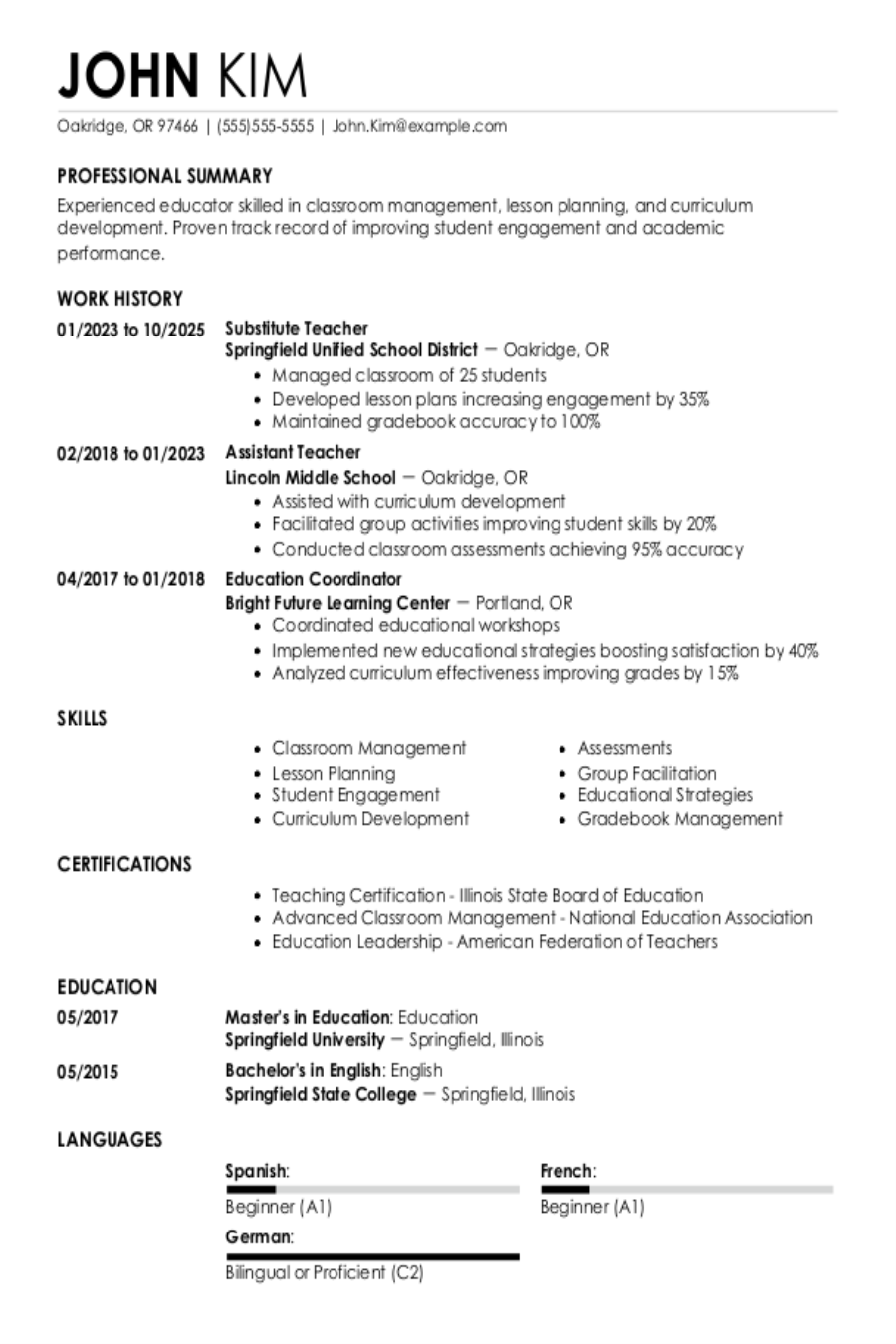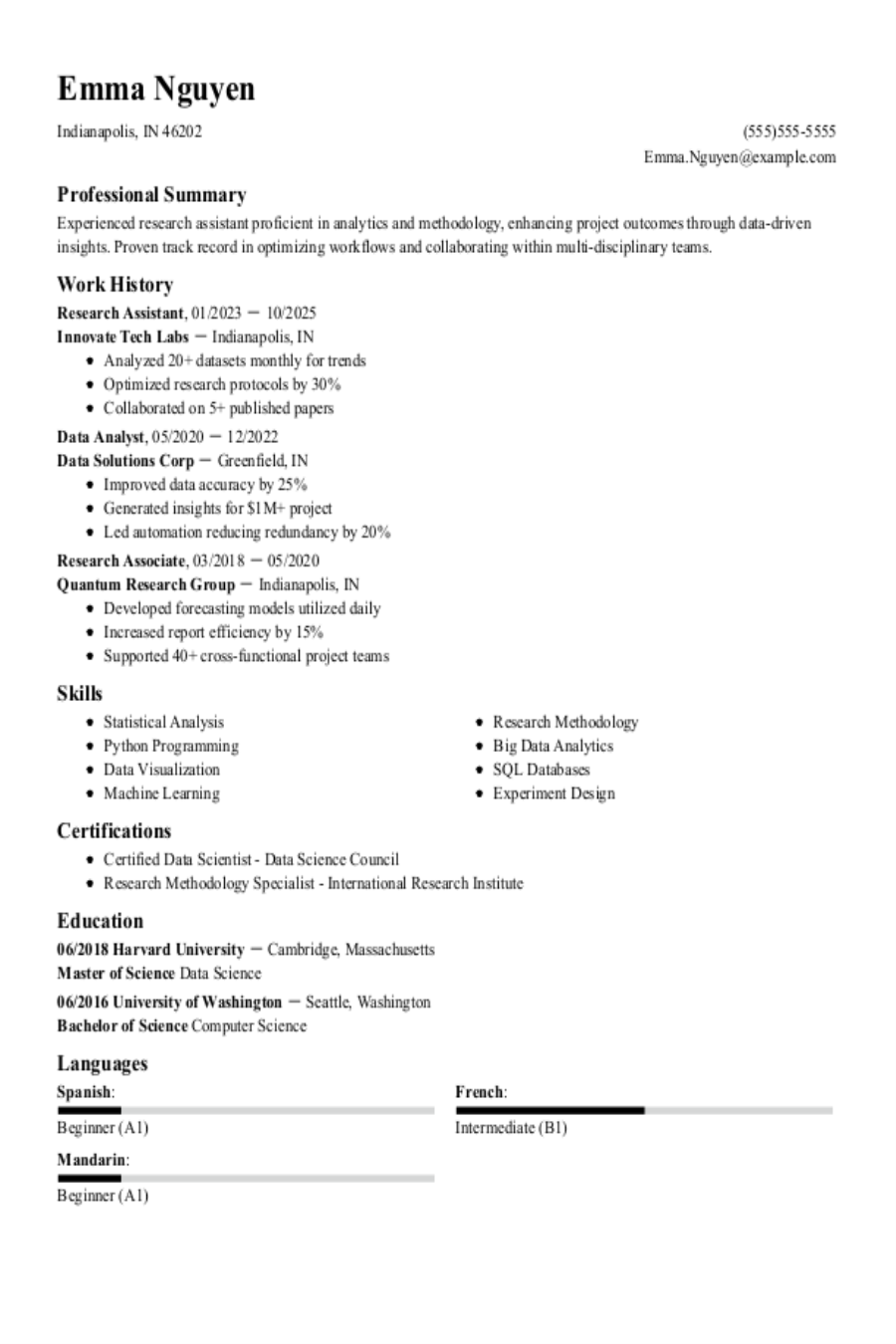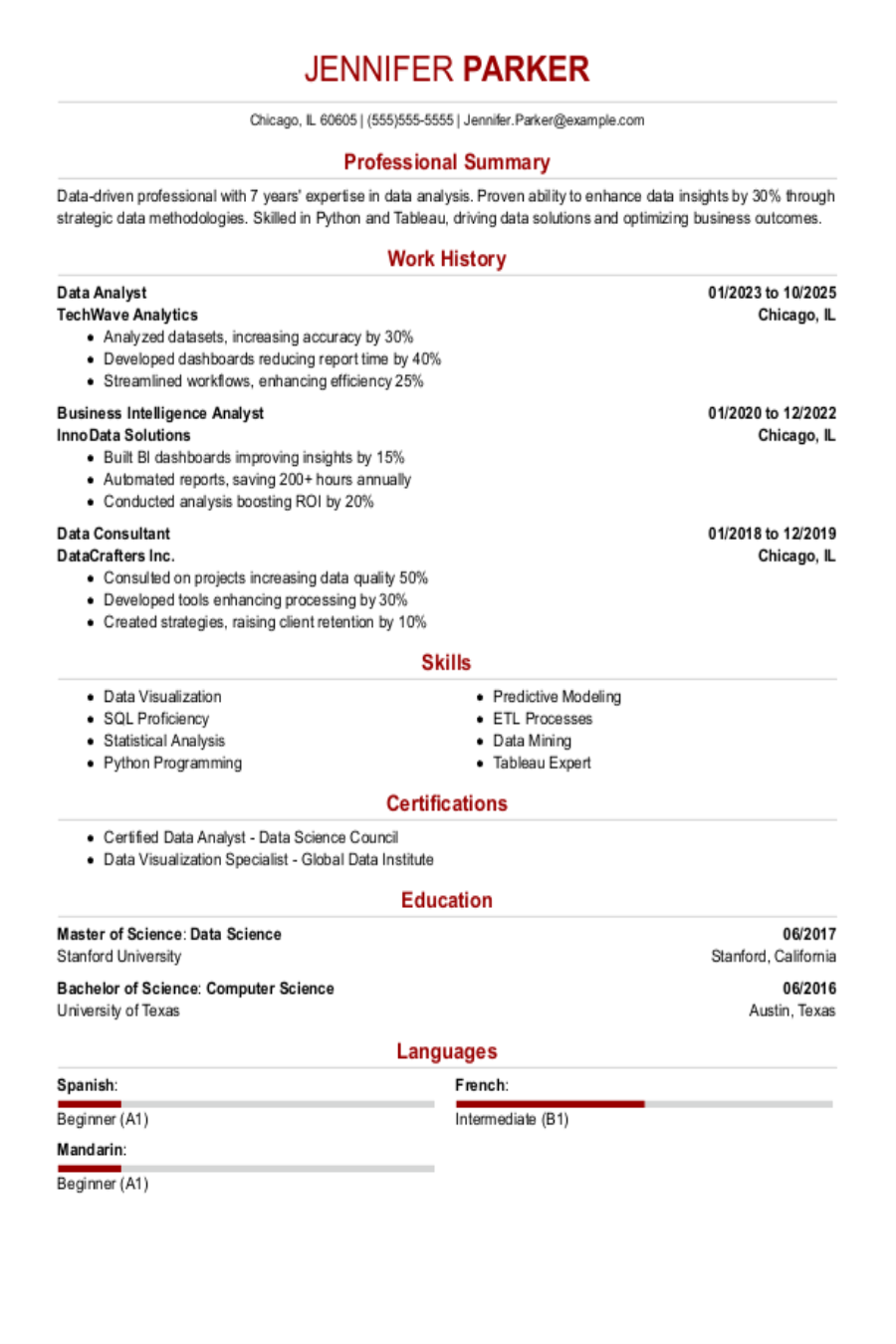Table of contents
Popular Logistics Coordinator Resume Examples
Entry-level logistics coordinator resume
An entry-level resume for a logistics coordinator should focus on relevant coursework, internships, technical skills in supply chain management, and strong organizational abilities to demonstrate potential effectiveness.
Prioritizes readability: Opting for a simple resume template ensures recruiters swiftly identify your logistics expertise and accomplishments, improving the effectiveness of your job application.
Showcases education: This resume features the education section near the top, enabling the candidate’s academic background to establish their authority.
Mid-career logistics coordinator resume
A mid-career logistics coordinator resume should emphasize a strong combination of relevant experience, logistical skills, and evidence of continuous professional growth to attract prospective employers.
Encourages quick scanning: Well-organized layouts and clear headings allow potential employers to quickly identify key qualifications and achievements, making it easier for them to recognize the job seeker's strengths in logistics coordination.
Employs active language: Using action verbs such as "streamlined," "implemented," and "coordinated" highlights initiative and showcases tangible results, effectively demonstrating the candidate's impact.
Experienced logistics coordinator resume
An experienced logistics coordinator resume should prioritize demonstrating key achievements and illustrating a clear path of career advancement in the logistics field.
Follows traditional format: The chronological resume format effectively showcases the extensive experience of the job seeker, presenting a clear timeline that highlights accomplishments and responsibilities while illustrating their career growth in logistics.
Embraces modern design: This modern resume template effectively showcases the applicant's innovative approach to logistics coordination, emphasizing their commitment to efficiency and professionalism in supply chain management.
No experience logistics coordinator resume
A resume for an applicant with no experience aiming to become a logistics coordinator should highlight relevant skills, volunteer work, and any coursework that showcases organizational abilities and attention to detail.
Simple style: The resume's streamlined design effectively highlights qualifications through clear sections and concise bullet points, ensuring key experiences stand out without unnecessary distractions.
Extracurricular activities: Including volunteer work and extracurricular activities improves a resume by highlighting relevant skills and experiences and demonstrating commitment to teamwork and organizational abilities beyond formal job roles.
More resume examples
Logistics Coordinator Resume Template
Looking for a solid foundation? This logistics coordinator resume template is ready for you to personalize with your own details and experiences.
Michael Kim
Newark, NJ 07105
(555)555-5555
Michael.Kim@example.com
Professional Summary
Driven Logistics Coordinator with expertise in optimizing supply chain operations and reducing costs. Proven leader with proficiency in ERP systems, enhancing efficiency and inventory management. Skilled in team leadership and strategic planning, committed to operational excellence.
Work History
Logistics Coordinator
Precision Shipping Solutions - Newark, NJ
February 2023 - October 2025
- Streamlined inventory by 20% using advanced ERP.
- Reduced transit costs by $50K annually.
- Coordinated operations for 100+ supply routes.
Supply Chain Specialist
Optimal Logistics Group - Jersey City, NJ
January 2019 - January 2023
- Enhanced delivery efficiency by 25% with metrics.
- Managed budgets to save $100K in costs yearly.
- Led a team improving warehouse productivity 30%.
Warehouse Operations Manager
Metro Freight Lines - Maplewood, NJ
May 2018 - January 2019
- Supervised shipments reducing error rates 15%.
- Implemented systems saving 12% on expenses.
- Trained staff resulting in 50% improved KPIs.
Skills
- Inventory Management
- Supply Chain Optimization
- ERP Systems Expert
- Budget Management
- Project Coordination
- Team Leadership
- Logistics Integration
- Data-Driven Analysis
Education
Master's Supply Chain Management
University of Denver Denver, Colorado
May 2018
Bachelor's Business Administration
Colorado State University Fort Collins, Colorado
May 2016
Certifications
- Certified Logistics Associate - American Society of Transportation and Logistics
- Six Sigma Green Belt - Six Sigma Institute
- Project Management Professional - Project Management Institute
Languages
- Spanish - Beginner (A1)
- French - Beginner (A1)
- German - Intermediate (B1)
Must-Have Skills on a Logistics Coordinator Resume
A strong skills section is essential for any effective resume, particularly in logistics where versatility and precision are key.
Project and process management professionals ensure initiatives move forward smoothly and systems function effectively. The skills you highlight should reflect your role in supporting goals and maintaining momentum. You resume is an opportunity to demonstrate how you help create order and drive successful outcomes.
The following data highlights the most sought-after hard and soft skills for logistics coordinators according to Resume Now’s internal resume data.
When you’re ready to improve your resume with relevant skills, check out our AI Resume Skills Generator. It provides tailored suggestions based on your job title, ensuring you present a comprehensive and personalized skill set.
Writing Your Logistics Coordinator Resume
Having explored effective resume examples, you are now prepared to dive into the detailed process of crafting your own. We'll guide you step by step, section by section, on how to write a resume that stands out.
List your most relevant skills
An effective skills section on your logistics coordinator resume should highlight both your technical skills, like inventory management and supply chain optimization, as well as essential soft skills such as communication and teamwork. By aligning your skills with the job requirements, you demonstrate to recruiters that you are well-suited for the position.
To improve your skills section, make sure to incorporate keywords from the job listing. This approach not only appeals to human recruiters but also ensures that applicant tracking systems recognize you as a qualified applicant. By carefully selecting relevant terms, you'll improve your chances of moving forward in the hiring process while clearly presenting your fit for the logistics coordinator role.
Example of skills on a logistics coordinator resume
- Proficient in coordinating shipments and managing logistics operations
- Skilled in using supply chain management software to optimize processes
- Strong communicator with a collaborative approach to problem-solving
- Detail-oriented with excellent organizational and multitasking abilities
Highlighting your soft skills on your resume can set you apart from other applicants. Employers greatly value interpersonal abilities since they are often challenging to develop, making them an important asset in any logistics coordinator role.
Highlight your work history
A strong work experience section should focus on using strong action verbs and relevant keywords to convey the impact of your contributions in previous roles.
For each job entry, essential information includes your title, employer’s name, and dates of employment. This helps employers quickly verify your background and assess your level of experience. Be sure to showcase accomplishments that are quantifiable, as these will stand out more than general responsibilities alone.
Example of a logistics coordinator work experience entry
- Logistics Coordinator
FedEx Supply Chain - Dallas, TX
June 2019 - August 2022 - Streamlined supply chain processes by implementing a new inventory management system, reducing order fulfillment time by 30%
- Coordinated shipments and logistics for over 150 clients, ensuring timely delivery and adherence to client specifications
- Led cross-functional teams in quarterly audits to improve compliance with safety regulations and improve operational efficiency
- Trained and mentored 10 junior coordinators on logistics best practices, fostering a collaborative team environment that improved productivity by 25%
- Used data analysis to forecast demand trends, optimizing stock levels and decreasing excess inventory costs by 15%
Aim for clarity in your resume bullet points. Focus on key accomplishments and use action verbs to convey impact, ensuring each point is concise yet informative enough to showcase your expertise without overwhelming the reader.
Include your education
The education section of your logistics coordinator resume should clearly list your academic credentials in reverse-chronological order, starting with your most recent degree. Include relevant diplomas and certifications while excluding your high school diploma if you hold a higher qualification.
If you are currently enrolled in a program or have not completed a degree, indicate the highest level of education achieved along with an expected graduation date. It can be beneficial to include bullet points that highlight relevant coursework or any academic honors.
Common certifications for a logistics coordinator resume
- Certified Supply Chain Professional (CSCP) – Association for Supply Chain Management (ASCM)
- Certified Logistics Associate (CLA) – Manufacturing Skill Standards Council (MSSC)
- Certified in Planning and Inventory Management (CPIM) – Association for Supply Chain Management (ASCM)
- Logistics and Supply Chain Management Certificate – American Society of Transportation and Logistics (ASTL)
Sum up your resume with an introduction
Creating an effective profile section for your resume is important, as it serves as your first opportunity to make a lasting impression on potential employers. This section succinctly summarizes your qualifications and sets the tone for the rest of your resume, helping recruiters quickly understand who you are and what you bring to the table.
If you have significant experience in logistics coordination, using a professional summary is ideal for showcasing your accomplishments. It should highlight key achievements and skills that demonstrate your expertise in managing supply chains, optimizing processes, and ensuring timely deliveries. If you don't yet have much experience, include a resume objective that focuses on your aspirations and development.
Professional summary example
Detail-oriented logistics coordinator with over 5 years of experience in optimizing supply chain processes within competitive markets. Demonstrated success in improving inventory management, reducing shipping costs, and improving delivery timelines. Highly proficient in coordinating cross-functional teams, data analysis, and implementing efficient logistical solutions.
Resume objective example
Enthusiastic logistics coordinator eager to use strong organizational and communication skills to improve supply chain efficiency at a forward-thinking company. Committed to applying problem-solving abilities and attention to detail to streamline operations and support team success.
As a logistics coordinator applicant, focus on crafting a resume profile that concisely packs essential information. Aim for three sentences at most, highlighting only your key qualifications and experiences. Elaborate further details in your cover letter to maintain a clear and powerful resume.
Add unique sections to set you apart
Including optional resume sections can help you highlight your unique qualifications as a logistics coordinator. These sections allow you to present additional skills and experiences that set you apart from other job seekers.
By showcasing relevant hobbies or volunteer work, you illustrate your commitment to the field. For instance, if you've volunteered for supply chain initiatives or participated in community service related to logistics, it reflects your dedication and values. Such details not only improve your resume but also provide insight into your working style and how you apply your skills outside of traditional job roles.
Three sections perfect for a logistics coordinator resume
- Languages: As a logistics coordinator, effective communication is important. Highlighting your language skills on your resume shows your ability to negotiate with international suppliers and work across cultures effectively.
- Volunteer Work: Including volunteer work on a resume can improve your professional skills and demonstrate your dedication to service. It showcases your ability to collaborate, manage projects, and contribute positively to the community.
- Accomplishments: In logistics coordination, quantifiable accomplishments are vital for proving your impact on efficiency and cost savings. Weave these achievements into your work experience or set them apart in a custom accomplishments section.
5 Resume Formatting Tips
- Choose a format that matches your career stage.
Selecting the right resume format is important for showcasing your qualifications effectively. If you have extensive experience, a chronological format will highlight your career progression clearly. For those new to the field, a functional format can emphasize skills and potential over work history. Consider a combination format for a well-rounded approach that captures both aspects.
- Pick a smart resume template.
Using a professional resume template can greatly improve the readability of your application. It provides a clean layout that showcases your qualifications effectively. Make sure to select an ATS-friendly design that highlights your experiences while keeping the formatting straightforward and accessible for hiring managers.
- Select an appropriate font.
Choose from professional font options like Arial or Calibri to make sure your resume is easily readable by both software and hiring managers.
- Use consistent formatting.
Align your resume to the left and use uniform margins. This creates a clean look that improves readability and presents you as organized and professional.
- Keep your resume to one or two pages.
When crafting your resume, aim for clarity and brevity. Generally, resumes should be one page long unless you have extensive experience that warrants a second page. Focus on the most relevant details to make a strong impression.
Tools for Your Job Search
Are you ready to advance in your logistics coordinator career? Before you hit submit on that application, consider using our ATS Resume Checker. This essential tool helps you understand how your resume will perform with the automated systems that many companies use for initial job seeker screening, ensuring you stand out from the competition.
Looking to elevate your resume even further? Our AI Resume Builder provides tailored recommendations specifically designed for your logistics background, along with professionally crafted templates that effectively showcase your skills and experiences to hiring managers.
Frequently Asked Questions
Last Updated: October 23, 2025
Absolutely. A cover letter is important as it adds depth to your resume and offers you another chance to connect with potential employers. It allows you to express what draws you to the logistics coordinator role and how your unique experiences make you an ideal job seeker. So, don’t hesitate—write a cover letter that improves your application.
For a quick solution, consider using our AI Cover Letter Generator! It helps you create customized, strong cover letters in just minutes. Plus, you can choose from various cover letter template options that perfectly match your resume, ensuring a professional presentation that stands out.
A resume is typically concise, spanning one to two pages, while a CV (curriculum vitae) can extend several pages and offers in-depth details about your academic history, research work, publications, and professional experiences. This difference in length reflects the level of detail included in each document.
You should use a CV for specialized roles in academia, science, law, or medicine where comprehensive documentation of your qualifications is necessary. If you need to create a tailored CV quickly and efficiently, our online CV Maker can help you streamline the process! Choose from various CV templates designed for different industries and career levels to craft the perfect document with ease.
To make your logistics coordinator resume stand out, select a polished, professional template and integrate relevant keywords from the job description. This will showcase your qualifications and align you with the employer's needs effectively.
To build a strong skills section as a logistics coordinator, combine your technical proficiencies in inventory management systems with soft skills like communication and problem-solving. In your experience section, illustrate how you applied these skills to optimize supply chain processes or improve delivery timelines, showcasing tangible results.
Logistics coordinators often begin their careers in entry-level positions such as shipping clerks. With experience and additional training, they can advance to senior coordinator roles or transition into management positions within logistics.
When applying for logistics coordinator roles, briefly state your career goals in your resume summary. For a deeper exploration of your aspirations, use your cover letter to explain how specific positions align with your professional growth. Focus on opportunities that improve skills and lead to advancement within the logistics field.
Was this information helpful? Let us know!
Hailey is a career advice writer dedicated to helping job seekers excel in their careers.
More resources

The AI Boss Effect: 97% of Workers Have Asked ChatGPT for Advice Instead of Their Manager
Resume Now s latest report explores how AI is replacing manage...

37 Unique Skills to Put on Your Resume
Trying to avoid the skills you see pop up on resumes repeatedl...

Resume Now Spotlights 14 High-Innovation, High-Growth Jobs That Pay $60K+
Resume Now s latest report highlights some of the highest payi...

Substitute Teacher Resume: Examples, Templates and Tips
Our resume examples templates and writing tips will help you ...

Research Assistant Resume: Examples & Templates for 2025
Was this information helpful? Let us know ...

Data Analyst Resume: Examples, Templates & Tips
Need a data analyst resume that gets interviews? Our guide can...

